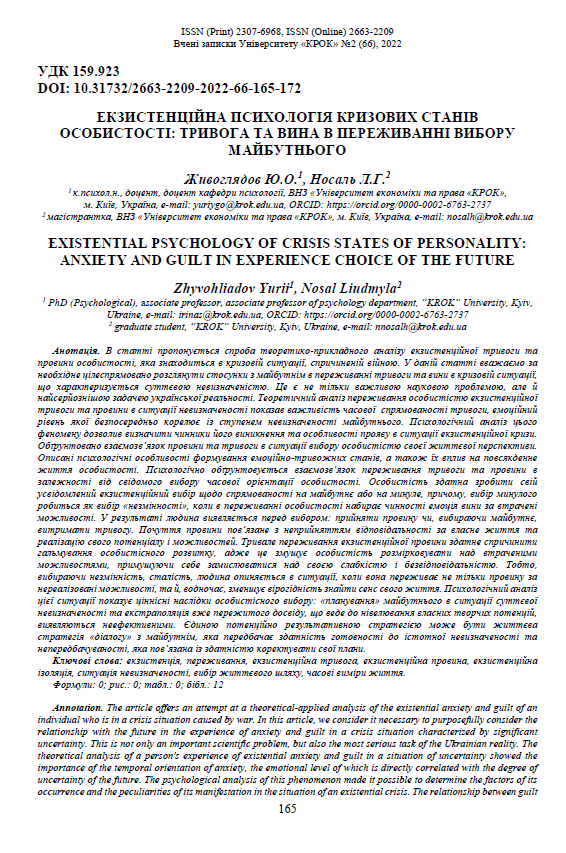EXISTENTIAL PSYCHOLOGY OF CRISIS STATES OF PERSONALITY: ANXIETY AND GUILT IN EXPERIENCE CHOICE OF THE FUTURE
DOI:
https://doi.org/10.31732/2663-2209-2022-66-165-172Keywords:
existence, experiences, existential anxiety, existential guilt, existential isolation, a situation of uncertainty, life path choice, temporal life dimensionsAbstract
The article offers an attempt at a theoretical-applied analysis of the existential anxiety and guilt of an individual who is in a crisis situation caused by war. In this article, we consider it necessary to purposefully consider the relationship with the future in the experience of anxiety and guilt in a crisis situation characterized by significant uncertainty. This is not only an important scientific problem, but also the most serious task of the Ukrainian reality. The theoretical analysis of a person's experience of existential anxiety and guilt in a situation of uncertainty showed the importance of the temporal orientation of anxiety, the emotional level of which is directly correlated with the degree of uncertainty of the future. The psychological analysis of this phenomenon made it possible to determine the factors of its occurrence and the peculiarities of its manifestation in the situation of an existential crisis. The relationship between guilt and anxiety in the situation of a person choosing his life perspective is substantiated. The psychological features of the formation of emotional and anxious states are described, as well as their impact on the daily life of an individual. The relationship between the experience of anxiety and guilt depending on the conscious choice of the individual's time orientation is psychologically substantiated. The individual is able to make a conscious existential choice regarding the orientation to the future or the past, and the choice of the past is made as a choice of "immutability", when the emotion of guilt for lost opportunities takes effect in the experience of the individual. As a result, a person is faced with a choice: to accept guilt or, choosing the future, to endure anxiety. The feeling of guilt is associated with not accepting responsibility for one's own life and realizing one's potential and capabilities. Long-term experience of existential guilt can cause inhibition of personal development, because it forces a person to reflect on lost opportunities, forcing himself to think about his weakness and irresponsibility. That is, choosing constancy, stability, a person finds himself in a situation where he not only experiences guilt for unrealized opportunities, but also, at the same time, reduces the probability of finding the meaning of his life. Psychological analysis of this situation shows the value consequences of personal choice: "planning" of the future in a situation of significant uncertainty and extrapolation of already experienced experience, which leads to the leveling of one's own creative potentials, turn out to be ineffective. The only potentially effective strategy can be a life strategy of "dialogue" with the future, which involves the ability to prepare for significant uncertainty and unpredictability, which is associated with the ability to adjust one's plans.
Downloads
References
Леонтьев Д. А. Экзистенциальная тревога и как с ней не бороться. Московский психотерапевтический журнал. 2003. №2.
Экзистенциальная психология. Москва : ЭКСМО-ПРЕСС, 2001. 624 с.
Василюк Ф. Е. Психология переживания. Москва : МГУ. 1984. 198 с.
Мадди С. Р. Теории личности: сравнительный анализ. СПб. : «Речь». 2002. 539 с.
Бьюдженталь Дж. Искусство психотерапевта. СПб. : Питер. 2001. 304 с.
Роджерс К. Эллен Вест и одиночество К. Роджерс Психология личности: под ред. Ю. Б. Гиппенрейтер, А. А. Пузыря, В. В. Архангельской. М. : АСТ : Астрель. 2019. 200–211 с.
Анастазі А., Урбіна С. Психологічне тестування: 7-е изд. КК, 2019. 688 с.
Deurzen E. van. Everyday Mysteries. L. : Routledge, 2018.
Тиллих П. Избранное: Теология культуры. Москва : 2020. 487 с.
Ялом И. Экзистенциальная психотерапия. Москва : Класс, 2000. 576 с.
Deurzen E. van. Paradox and Passion in Psychotherapy. Chichester: Wiley and Sons, 1998.
Мэй Р. Искусство психологического консультирования. Как давать и обретать душевное здоровье. Москва : Апрель Пресс, ЭКСМОПресс, 2021. 256 с.

Downloads
Published
How to Cite
Issue
Section
License
Copyright (c) 2022 Zhyvohliadov Yurii, Nosal Liudmyla

This work is licensed under a Creative Commons Attribution 4.0 International License.

